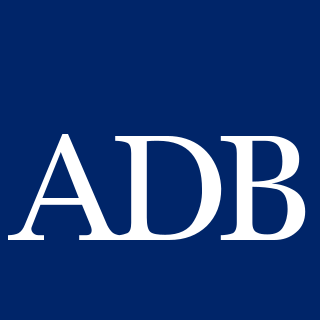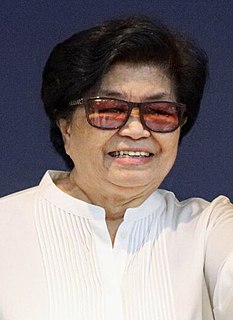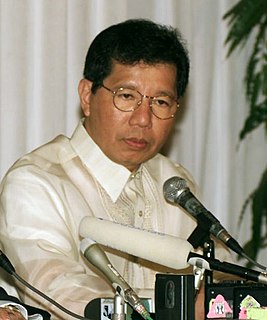
The Asian Development Bank (ADB) is a regional development bank established on 19 December 1966, which is headquartered in the Ortigas Center located in the city of Mandaluyong, Metro Manila, Philippines. The bank also maintains 31 field offices around the world to promote social and economic development in Asia. The bank admits the members of the United Nations Economic and Social Commission for Asia and the Pacific and non-regional developed countries. From 31 members at its establishment, ADB now has 68 members.

The Ateneo de Manila University, also known simply as the Ateneo de Manila, the Ateneo, or AdMU, is a private, research, basic and higher education institution founded and run by the Society of Jesus in Quezon City, Philippines. Founded in 1859 as Escuela Municipal de Manila, it is the second-oldest Jesuit-administered institution of higher learning in Asia-Pacific.

The South Asian Association for Regional Cooperation (SAARC) is the regional intergovernmental organization and geopolitical union of states in South Asia. Its member states are Afghanistan, Bangladesh, Bhutan, India, Maldives, Nepal, Pakistan, and Sri Lanka. SAARC comprises 3% of the world's land area, 21% of the world's population and 5.21% of the global economy, as of 2021.

Hankuk University of Foreign Studies is a private research university based in Seoul, in South Korea. HUFS consistently ranks as one of the best universities in South Korea. The university currently teaches 45 foreign languages. In addition, it contains studies in humanities, law, social sciences, business, medical science, natural sciences, and engineering.

The University of the Philippines Manila (UPM) is a state-funded medical and research university located in Ermita, Manila, Philippines. It is known for being the country's center of excellence in the health sciences, including health professional education, training, and research. It is the oldest of eight constituent universities of the University of the Philippines System, even predating the founding of UP by three years. Originally established on December 1, 1905, as the Philippine Medical School and later called as the UP College of Medicine and Surgery on June 10, 1907. It was renamed as University of the Philippines Manila in 1983.

The Central Philippine University is a private research university in Iloilo City, Philippines. Established in 1905 through a benevolent grant of the American industrialist and philanthropist, John D. Rockefeller, as the Jaro Industrial School and Bible School under the auspices of the American Baptist Foreign Mission Society, it is the first Baptist founded and second American and Protestant university in the Philippines and in Asia. In 1913, women were first admitted to the school and it was later converted into a junior college in 1923 as Central Philippine School and as Central Philippine College in 1924. In 1953, the college attained university status.

The Department of Foreign Affairs is the executive department of the Philippine government tasked to contribute to the enhancement of national security and the protection of the territorial integrity and national sovereignty, to participate in the national endeavor of sustaining development and enhancing the Philippines' competitive edge, to protect the rights and promote the welfare of Filipinos overseas and to mobilize them as partners in national development, to project a positive image of the Philippines, and to increase international understanding of Philippine culture for mutually-beneficial relations with other countries.

Clarita Reyes Carlos is a Filipino political scientist and commentator, academic, and educator who is currently serving as the National Security Adviser under the administration of President Bongbong Marcos. As National Security Adviser, she concurrently serves as the Director-General of the National Security Council and Vice Chairperson of the Anti-Terrorism Council. She served as the 16th President of the National Defense College of the Philippines from 1998 to 2001, becoming the first female and first civilian to lead the institution.

Orlando Sanchez Mercado, better known as Orly Mercado, is a Filipino politician and broadcast journalist best known for having served as a senator of the Philippines from 1987 to 1998, Secretary of Defense from 1998 to 2001, and for his long career as a broadcast journalist, most famously for hosting the television program Kapwa Ko Mahal Ko.
The University of the Philippines - National College of Public Administration and Governance, a degree-granting unit of the University of the Philippines Diliman, is the first school of public administration and public policy in Asia and the top educational institution in the said academic field and practice in the Philippines. It was established in 1952.

Partnerships in Environmental Management for the Seas of East Asia (PEMSEA) is a regional partnership programme implemented by the United Nations Development Programme (UNDP) and executed by the United Nations Office for Project Services (UNOPS). The project, started in 1994, was originally known as Prevention and Management of Marine Pollution in the East Asian Seas (SDS-SEA).

The Ministry of Foreign Affairs or commonly known by its abbreviations as, is an Indonesian government ministry responsible for the country's foreign politics and diplomacy. The ministry was formerly known as the Department of Foreign Affairs until 2008 when the nomenclature changed with the enactment of the 2008 State Ministry Act.

Far Eastern University, also known simply as FEU, is a private research university in Manila, Philippines. Created by the merger of Far Eastern College and the Institute of Accounts, Business, and Finance, FEU became a university in 1934 under the guidance of its first president, Nicanor Reyes Sr.
Rommel C. Banlaoi is a Filipino political scientist, security analyst, and an international studies expert. He was briefly designated as a Deputy National Security Adviser in July 2022 but he returned to his work as an independent peace, counterterrorism, and security studies advocate in August 2022. He is a celebrity professor known for his scholarly works on international terrorism, South China disputes, and geopolitical issues. He is the Chairman of the Philippine Institute for Peace, Violence and Terrorism Research (PIPVTR) and President of the Philippine Society for Intelligence and Security Studies (PSISS), both academic and non-governmental organizations.
Fred W. Riggs was a political scientist and pioneer Public Administration, especially his Riggsian Model. He was Professor Emeritus at Political Science Department of University of Hawaii.
Alex Bello Brillantes Jr. is a Filipino political scientist and expert of local governance and development administration. He was the dean of the University of the Philippines - National College of Public Administration and Governance (UP-NCPAG) and executive director of the Local Government Academy (LGA) under the Department of the Interior and Local Government (DILG).
The East Asian Bureau of Economic Research (EABER) is a forum for economic research and analysis of the major issues facing the economies of East Asia.

The Academy of Family Physicians of India (AFPI) is a professional academic society, registered as a non-profit organization in India. AFPI has been founded with the aim of promoting family medicine and primary healthcare. Family medicine is the practicing speciality and academic discipline of majority Indian doctors. Although there were GP associations such as IMA CGP and FFPAI have been existing for several decades, there was no forum for spearheading development of academic family medicine in India. AFPI is an equivalent organization to American Academy of Family Physicians, College of Family Physicians of Canada, Royal College of General Practitioners, Royal Australian College of General Practice for India.

Wendel Eliot Avisado is a Filipino lawyer and politician who previously served as Secretary of Budget and Management of the Philippines from 2019 to 2021. He was appointed by President Rodrigo Duterte on August 5, 2019, succeeding Undersecretary Janet B. Abuel, who served as the DBM's Officer-in-Charge (OIC) following the appointment of former Secretary Benjamin E. Diokno as Governor of the Bangko Sentral ng Pilipinas. Besides having a long and distinguished career in government service, he is an active member of the Boy Scouts of the Philippines. He previously served as National President of the Boy Scouts of the Philippines from 2017 to 2019 and an ex-officio member of the national executive board.

Pan Suk Kim is a South Korean professor in the field of public administration. He is currently a commission member of the International Civil Service Commission of the United Nations and the International Director of the American Society for Public Administration. Kim is currently a professor emeritus of Public Administration in the Department of Global Public Administration, Yonsei University, Mirae Campus in South Korea.















